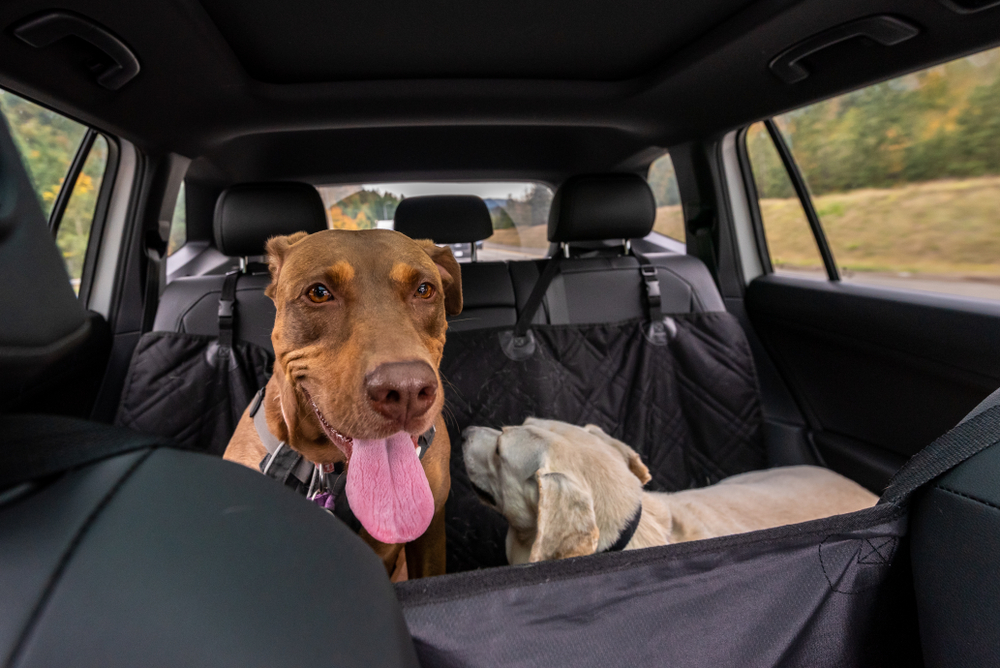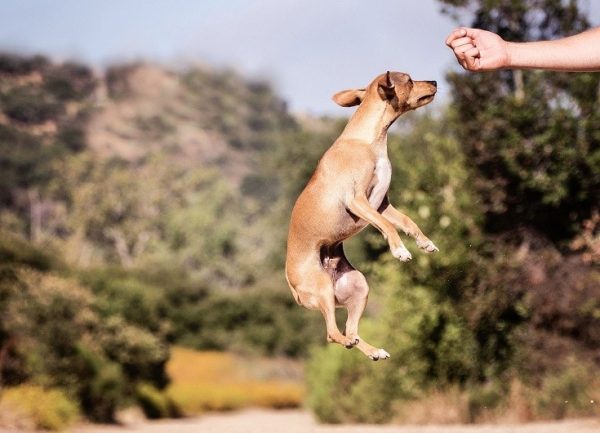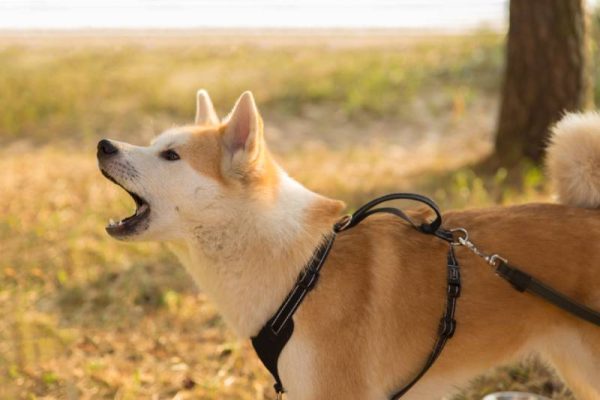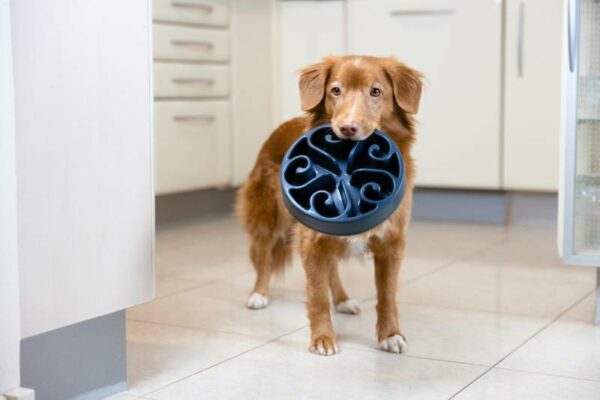Most dogs love car rides and will gladly accompany their owners every time they hit the road. You might let your dog jump in the back seat of your car and think very little about the safety aspect of the situation.
You also see pups riding along in the back of people’s pickup trucks and hanging with their entire bodies out of the window at stoplights. It’s not uncommon for people to travel with their dogs and the dog is in some not-so-safe situation.
Every owner is different, and it’s up to you to make the decisions to keep your dog safe. In this article, we’ll discuss a little bit about road safety and some items you might want to have on hand while you travel to ensure that your pup stays safe on the road.

The 8 Tips For Car Safety With Your Dog
1. Don’t Let Your Dog Roam Free in the Vehicle
You want them to be comfortable and enjoy themselves while they’re on the road. But there are several reasons why it is, unfortunately, not a good idea for your pup to be loose while the car is in motion.
First, the motion itself is likely to cause car sickness, especially in younger dogs. If your dog is free in the car, their motion combined with the motion of the car might make it twice as likely for them to get sick. But when they are in their enclosure or their vision is guarded somehow against the constant movement, they are more likely to keep from tossing their cookies.
The next reason is that even a very small impact can have major, potentially life-threatening consequences for your dog. Even at low speeds, running into someone’s bumper, hitting a curb, or experiencing any other kind of accident can send your dog flying, which can break bones. It can also cause blunt force trauma or injury to other passengers in the vehicle.
If your dog is riding shotgun and you don’t have anyone to keep them still, they can even cause you to have an accident. Dogs are known not to understand boundaries very well regarding affection and contact, and this includes while you are driving.

2. Have Restraints on Hand
There are tons of ways that you can restrain your dog in the car. The method you choose will be based on your dog’s age, car experience, activity level, and other factors. You wouldn’t want to put your tiny Shih Tzu in a large cage, for example.
Always buy according to your dog’s needs and never skip on quality. Some options include:
Crates
Crates are best for inexperienced dogs who might get frantic or car-sick on rides. They are fully enclosed, and crate-trained dogs feel secure in a crate. Plus, it obstructs their vision a bit, which may help calm angry tummies.
Canine Car Seats
Car seats for dogs come in all shapes and sizes. So, be sure to do proper research and buy the most appropriate selection for your dog’s weight. These contraptions have safety features and clasps to connect to your dog’s gear, keeping them situated.
Seat Belts
Seat belts hook to your dog’s harness. It keeps them in place in the event of an accident but allows them a little freedom to sit up or lay down as they wish.
3. Avoid Jarring
You shouldn’t be driving hog wild when you have a canine companion on board. Try to remember that they will be bouncing and banging around if you aren’t careful.
Even if you have them in pretty sturdy restraints, it can still cause them a lot of unnecessary, potentially painful movement. If you typically are a little bit more of an aggressive driver, you should drive a little slower and pay attention to how soon you’re braking or turning.
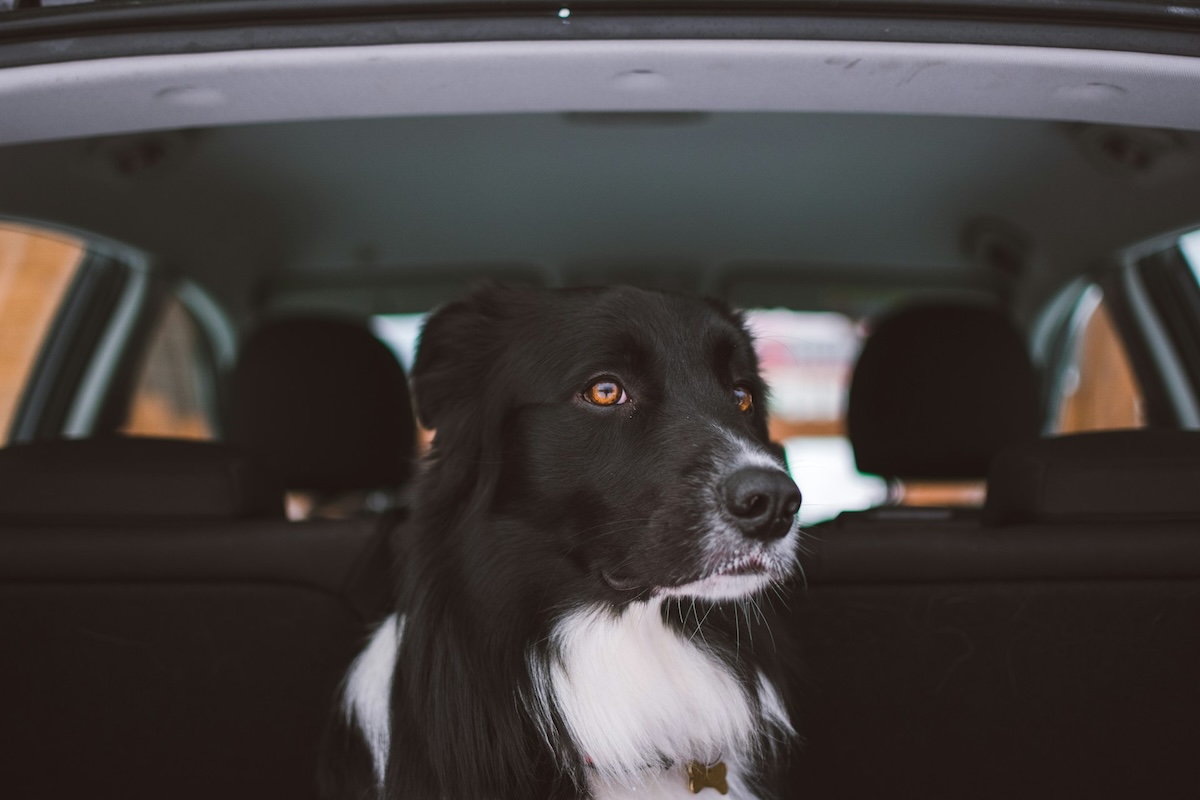
4. Get Medications If Needed
Some dogs can get car sick quite easily. With all that movement that they’re not used to, it can certainly cause upset. You probably even know humans that get carsick quite easily.
If you anticipate your dog might get sick, there are products on the market that can help alleviate a lot of these symptoms. Ask your vet to prescribe you some anti-nausea medication or recommend a supplement. Never give your dog nausea medication intended for humans without veterinary approval. In some cases, if the car sickness is anxiety-related, your veterinarian will prescribe short-acting tranquilizers or supplements.
If you need to speak with a vet but can't get to one, head over to PangoVet. It's our online service where you can talk to a vet online and get the advice you need for your dog — all at an affordable price!
5. Have an Emergency Plan
It is important to have a plan in the event of a car crisis. If you break down on the side of the road, that can be a hazardous situation, especially if you’re on the shoulder of a highway.
Often, people opt for services like AAA in the event that they are broken down for any reason. Always make sure to let the tow company know that you do have a dog and that you will need accommodating.
Also, having added layers of protection, such as dog health insurance, can help you if you have to make any emergency vet visits. Having some basic supplies on hand like water bowl, extra leashes, first-aid, and cleaning supplies can come in handy.
6. Don’t Leave Your Dogs in Hot Cars
Even though the temperature on the inside of the car might not seem that bad, it is never advisable to leave a dog locked in a hot car of any kind. On a 90°F day, within just 10 minutes, potentially fatal temperatures of 109°F can manifest inside a car, even with windows cracked.
Since dogs regulate body temperature through sweating from their foot pads and panting, they’re not great at cooling themselves off. Short-faced dogs like Pugs and French Bulldogs have even more trouble cooling off. Warm temperatures can put them at risk of “hyperthermia” or overheating. This condition can quickly evolve into heat stroke and, subsequently, organ damage, seizures, and death.

7. Don’t Let Dogs Ride in the Truck Bed or Trunk
We would never advise letting a dog ride in the truck’s bed or the trunk regardless of whether it has restraints. In the event of a collision, that is the most unsafe place your dog could possibly be. So many things can go wrong in this situation. Your dog could be thrown from the vehicle, jump from the vehicle, or be clipped by an oncoming vehicle. In a rear-ending accident, the trunk is likely to crumple. There are far more risks than benefits.
8. Don’t Limit Car Rides
You will never want your dog to be stuck at home all the time. Even if you’re not a frequent outings person, you will want to make sure they’re acclimated to the car for vet visits and other trips. It is important to get your dog used to it relatively early.
Your dog might be a little uncertain at first, but soon, a car ride will be a great source of joy. Just jingle the keys—and here they come running. If you limit car rides, they might show fear-based reactions when you try to put them in a car.
Early on, puppies might get car sick, making it challenging to bring them along. However, this issue usually resolves as they get older. If your dog is scared of the car apply desensitizing and counter-conditioning training to help them to accept it.

Conclusion
Now you understand a little bit more about how to navigate car rides with your dog. Adventures in the car can be such a fun experience for dogs, but they can also be dangerous. Even though we might not inherently think about the car being unsafe, one bump in the road could send your dog flying. So it’s always best to make sure you’re practicing vehicle safety when your pup is on board.
Also see:
Featured Image Credit: knelson20, Shutterstock
